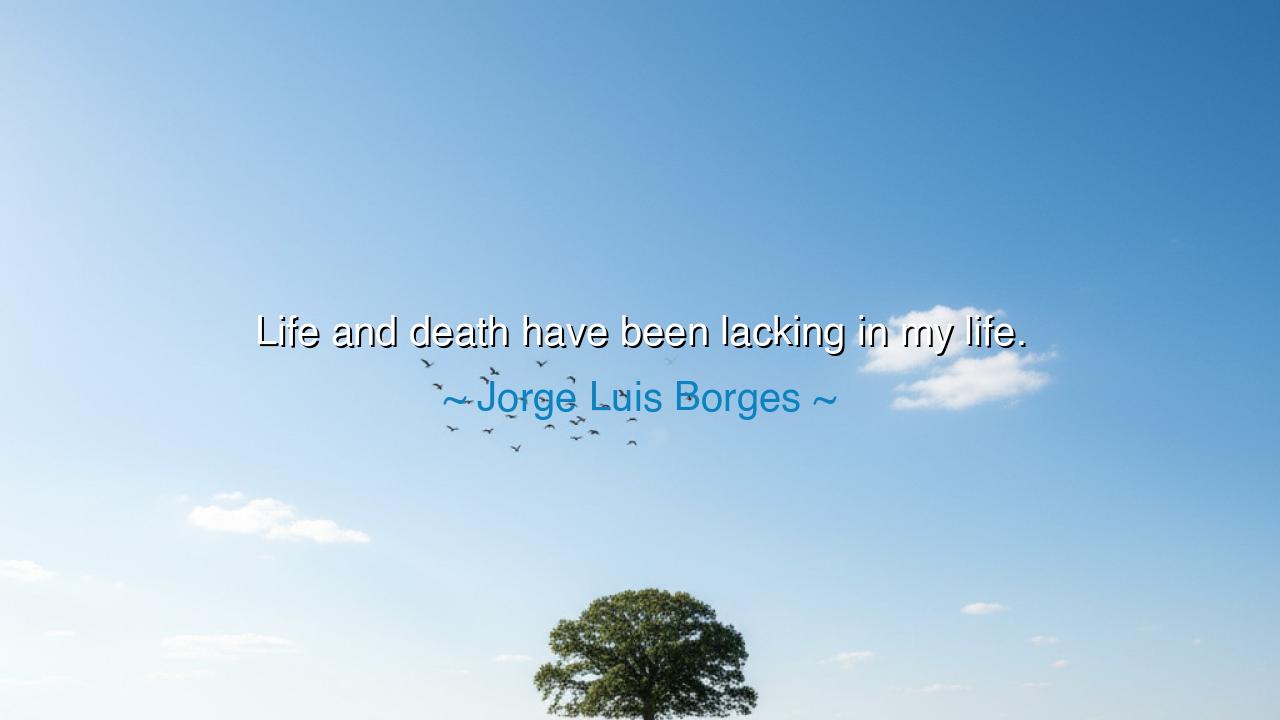
Life and death have been lacking in my life.






“Life and death have been lacking in my life.” Thus spoke Jorge Luis Borges, the Argentine poet and philosopher, whose mind was a labyrinth of mirrors, symbols, and eternal questions. In this haunting reflection, Borges unveils a paradox both intimate and universal: that one can live without truly living, and exist without ever confronting the sacred weight of mortality. His words are not of despair, but of recognition — the lament of a man who has dwelled much in the realm of intellect and imagination, yet feels the pulse of life and the presence of death have somehow eluded him.
The origin of this quote lies within Borges’ later years, when blindness had become his constant companion and solitude his familiar guest. A man of immense learning, he had spent his days in libraries, surrounded by ideas, myths, and languages, building worlds of thought more vast than the world itself. Yet in his old age, he confessed that he had perhaps lived too much within the mind and too little within the raw immediacy of existence. To say that “life and death have been lacking” is to admit that he had known reflection more than experience — that his life, rich in intellect, had been poor in passion.
This confession echoes through the corridors of history, for many who seek understanding often lose touch with being. Borges, like the philosophers of ancient Greece, was a lover of wisdom — yet he realized, as Socrates once did, that knowledge without the savor of life is but a shadow. To think deeply and yet never feel deeply is a kind of half-existence. When Borges speaks of death, he does not mean only the physical end, but the confrontation with one’s own finitude — the acceptance that each moment is fleeting, and thus infinitely precious. He felt that perhaps he had avoided this confrontation, living instead within the safety of abstraction.
Consider the tale of Prince Siddhartha, who became the Buddha. Born into luxury, he was sheltered from all sorrow and decay. His father forbade him to see sickness, old age, or death. But one day, Siddhartha ventured beyond the palace walls and beheld all three — and for the first time, he truly saw. In that moment, he awakened to the reality that had always surrounded him: that to live without awareness of death is not to live at all. Borges’ lament is the same. The man who has not felt the tremor of mortality has not yet tasted the full flavor of life.
In Borges’ words also lives a deeper truth — that life and death are not opposites, but reflections of each other. To know one is to know the other. The fullness of being comes not from denying death, but from embracing it as part of the same sacred rhythm. The poets of old understood this well. The Japanese masters of haiku would meditate on falling leaves, the scent of fading blossoms, or the sound of rain, finding in impermanence the very essence of beauty. In contrast, Borges, who spent his life amid the eternal — in libraries, symbols, and dreams of infinity — longed for that fleeting taste of the real.
Yet there is no bitterness in his confession. Instead, it carries a quiet reverence — the awareness that even in absence there is meaning. To recognize what one has lacked is itself a kind of awakening. In admitting that he had missed the pulse of life and the whisper of death, Borges invites us, his readers, to live more fully. To love boldly, to grieve honestly, to walk in the sunlight and feel the weight of passing time — these are not weaknesses, but the very acts that make us human.
So, my child of thought and wonder, take this lesson from the blind seer of Buenos Aires: do not hide from life in the comfort of ideas, nor flee from death in the illusion of eternity. Read and dream, yes — but also live. Stand before the sunrise and know that it will not last. Speak the words you have withheld. Touch the world before it fades. For to live is to dance between light and shadow, between birth and death — and to know both is to finally awaken. As Borges teaches us, let neither life nor death be lacking in yours.






AAdministratorAdministrator
Welcome, honored guests. Please leave a comment, we will respond soon